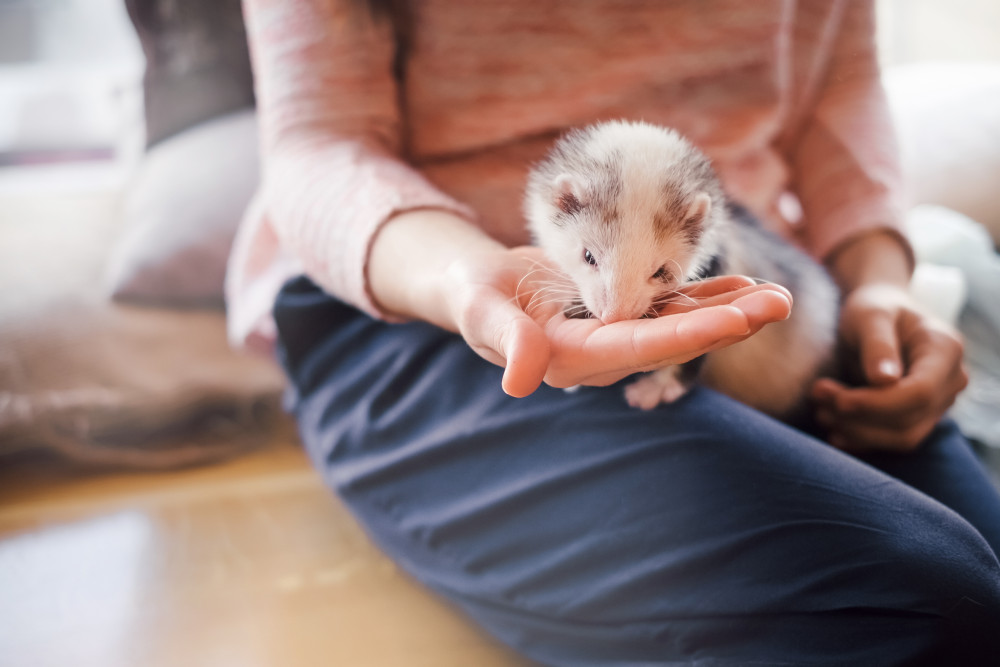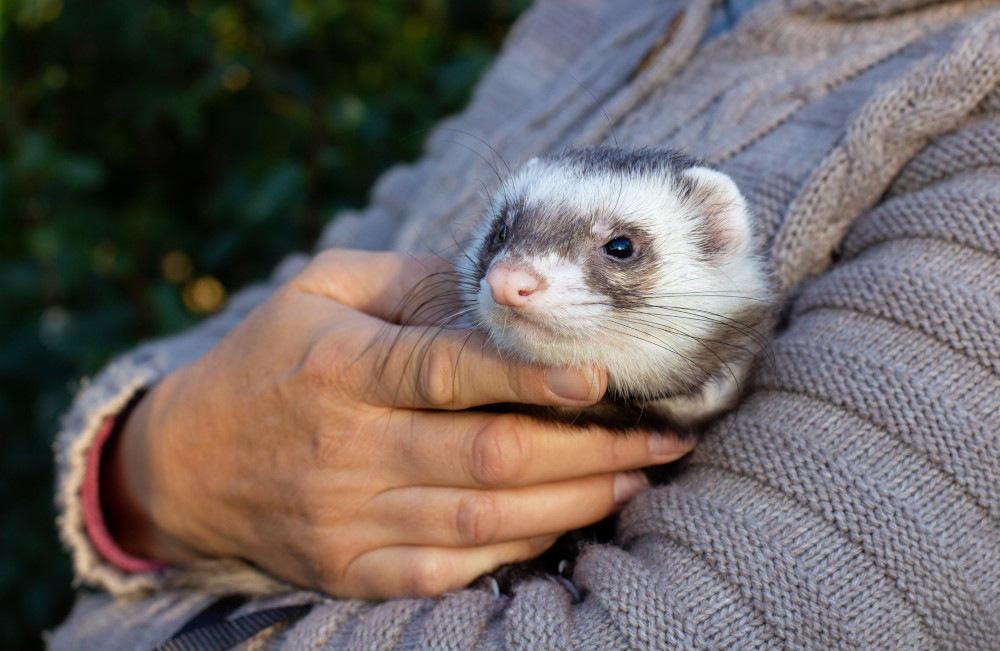
As with all animals, ferrets should be handled gently and with kindness and patience. They should be given choice about if, when, and how they interact with people. Using reward-based training (e.g., things they enjoy like treats and strokes) to create a positive association with humans and handling from an early age and regular enjoyable interactions helps to foster a good relationship and bond with your ferrets.
Ferrets should be introduced to new people, experiences, and items gradually and allowed to choose the pace and way they engage. With anything new, take it step by step and be patient while your ferret gets used to this new experience, rewarding them at each step of the way and not proceeding to the next step until they are comfortable. This includes gradually introducing and habituating your ferrets using positive reinforcement to items and experiences like a harness and leash, grooming, physical examination (daily checks and at the vet), carriers and transport. Please note that collars should not be used on a ferret, and they must never be tethered.
How to pick up your ferret
Although ferrets are bigger and more robust than other small pets, they can still be injured if they’re handled incorrectly or roughly. Make sure everyone in your household understands how to pick up and hold your ferret. New members of your household or people who are unfamiliar with ferrets will also likely need your help with understanding how to interact properly with ferrets. Ferrets are always more likely to want to be held once they’ve burned off some energy (this is one reason why young, energetic ferrets may give you a nip – they just want to get moving!). Wherever possible, play games with them and let them explore their secure area before you attempt to pick them up or cuddle them.
When you’re ready to pick up your ferret, always remember that they like to feel secure and supported, and their long back needs to be protected against excessive twisting or violent movement.
Adults and older children should place one hand under (or around) your ferret’s chest and then, using your other hand, lift and support the hind legs with your other hand. Bring your ferret up to your body, holding them close for security.

Children should be closely supervised at all times around ferrets and should be taught how to interact positively, gently, and calmly with ferrets. Young children should interact with ferrets by sitting on the floor (or on a low seat) with a treat in their lap. The ferret will likely climb into the child’s lap and take the treat. Once your ferret is used to being handled by a child, and the child is comfortable with the idea, the ferrets can be picked up and cuddled.
Biting
While most ferrets really enjoy spending time with their human companions and are usually happy to be picked up and cuddled, sometimes things can go wrong. Ferrets will occasionally nip or bite their human companions, often without obvious warning. This can occur:
- If they’re frightened or accidentally hurt
- If they are young
- If they are teething
- If they are nursing kits
- If they’re not used to being handled
- If your hand smells like food (particularly at meal times or if they are hungry)
- As part of grooming behaviour (licking followed by biting). As part of aggressive play.
Getting ferrets used to being picked up when they’re young using positive reinforcement is really important. Handled positively from an early age, your ferrets will usually be really laid back, enjoy your company and love being picked up for cuddles. Handle them regularly to maintain a social bond between you.
Avoid letting your ferret lick you (as this can progress to a bite) and also do not encourage or engage in aggressive/vigorous play with your hands or other parts of your body (including tug of war games!).
What to do if you get bitten:
- NEVER punish your ferret by yelling, hitting them, or throwing them away from you.
- Gently scruff your ferret if you need to move them (or yourself).
- Walk away for 2-3 minutes if your ferret bites you.
- If your skin is broken, wash the wound thoroughly with soap and water and contact your doctor to see if medical treatment is necessary.
Remember, handling your ferrets every day from an early age, and in a fun and positive way is a great way to develop a solid bond between you and them. This will be incredibly rewarding to you all.
The use of reward-based training and gradual habituation greatly assists handling, as your ferrets will look forward to seeing you, and will want to interact!
Older ferrets readily show affection for their human owners through gleeful greeting behaviour and willingness to shower their owners with ferret kisses. Young ferrets, on the other hand, are not likely to enjoy quiet cuddle time. Their exploratory behaviour creates too strong an urge to get off an owner’s lap and move on to investigate the environment around them. As ferrets mature, a combination of age, improved socialisation, and a decrease in exploratory behaviour results in a more settled calm ferret who enjoys periods of quiet snuggling and petting.
Try different activities and see what your ferret enjoys. Once you know their preferences, you can pick a variety of activities they enjoy and give them the choice to engage in these with you regularly.
References
Meredith A (2016) Ferret behaviour, housing and husbandry. In: Johnson-Delaney C (ed) Ferret Medicine and Surgery. CRC Press, pp 31–46
PDSA UK How to hold a ferret safely.
Quesenberry K, de Matos R (2020) Basic Approach to Veterinary Care of Ferrets. In: Quesenberry K, Orcutt C, Mans C, Carpenter J (eds) Ferrets, Rabbits, and Rodents, 4th ed. W.B. Saunders, pp 13–26
RSPCA UK (2023) Ferrets. Accessed 7 Jul 2023

